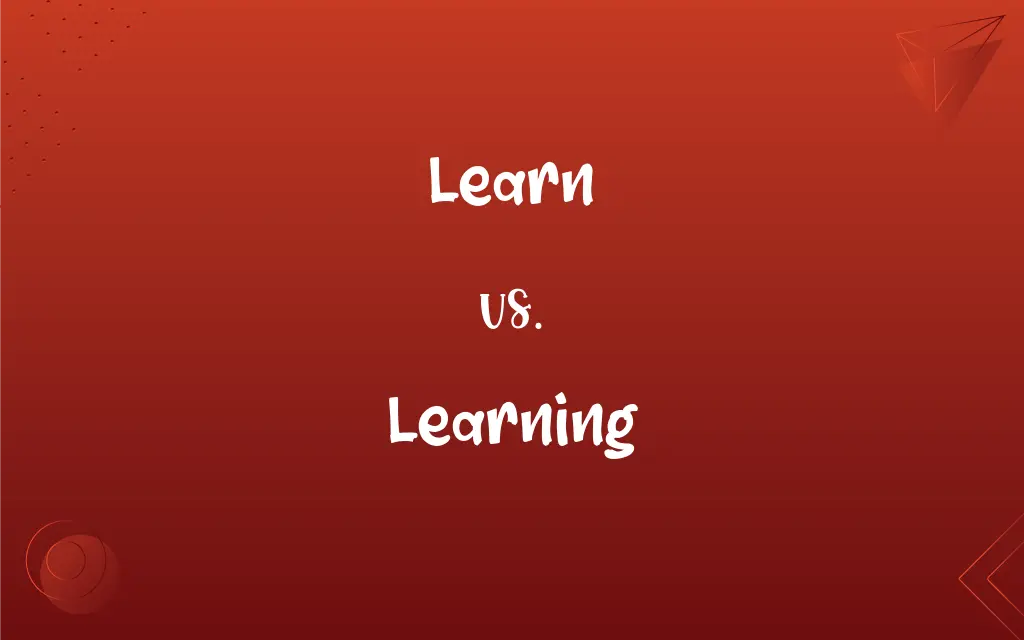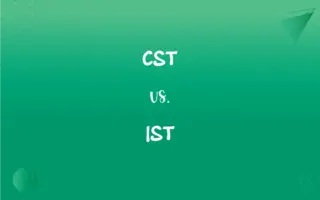Learn vs. Learning: What's the Difference?
Edited by Harlon Moss || By Janet White || Updated on November 1, 2023
"Learn" is a verb denoting the act of acquiring knowledge or skill, while "learning" is the continuous process or the noun form of the act.

Key Differences
"Learn" and "Learning" both pertain to the acquisition of knowledge or skills, but they differ primarily in their grammatical roles. "Learn" is a verb, implying an action or an event of gaining knowledge or skill. For example, one might say, "I want to learn Spanish."
"Learning," on the other hand, can be used both as a noun and as a gerund (a verb form ending in -ing). As a noun, it represents the knowledge or skill acquired. As a gerund, it describes the ongoing process of acquiring knowledge. For instance, "Learning Spanish is fun" uses "learning" as a gerund, whereas "His learning is evident" uses it as a noun.
The difference between "Learn" and "Learning" also manifests in their usage in sentences. "Learn" often requires a direct object (something being learned), whereas "learning" can stand alone, especially when used as a noun, to indicate acquired knowledge or the ongoing process.
To sum up, while both "Learn" and "Learning" relate to the acquisition of knowledge or skills, "Learn" is specifically an action verb, and "Learning" can refer to either the continuous process (as a gerund) or the result of that process (as a noun).
Comparison Chart
Grammatical Role
Verb
Noun, Gerund
ADVERTISEMENT
Definition
Act of acquiring knowledge or skill
Continuous process or result of acquiring knowledge
Usage in Sentence
Requires a direct object often
Can stand alone as subject or object
Example
"She wants to learn."
"She enjoys learning." (gerund) "Her learning is vast." (noun)
Verb Tense
Base form of the verb
Represents continuous action
Learn and Learning Definitions
Learn
Become aware of something.
I just learned of the news.
ADVERTISEMENT
Learning
The activity of gaining knowledge.
Learning is a lifelong journey.
Learn
Acquire knowledge or skill.
I want to learn how to dance.
Learning
Understanding gained from experience.
Through his travels, his learning deepened.
Learn
Be taught through experience.
He learned patience the hard way.
Learning
The process of studying a subject.
Online learning has become popular.
Learn
Understand, especially gradually.
I'm starting to learn what makes her tick.
Learning
Continuous engagement in the acquisition of knowledge.
She believes in proactive learning.
Learn
Commit to memory.
I need to learn my lines for the play.
Learning
Acquired knowledge or skills.
His learning in art is impressive.
Learn
To gain knowledge of or skill in through study, instruction, or experience
Learned how to sail.
Learned the new computer program.
Learn to speak Hindi.
Learning
The act, process, or experience of gaining knowledge or skill.
Learn
To become aware or informed of; find out
Learned the truth about him.
Learned that it was best not to argue.
Learning
Knowledge or skill gained through schooling or study.
Learn
To fix in the mind or memory; memorize
Learned the speech in a few hours.
Learning
(Psychology) Changes in behavior resulting from experience, especially changes due to conditioning.
Learn
(Nonstandard) To cause to acquire knowledge; teach.
Learning
(uncountable) An act in which something is learned.
Learn
(Obsolete) To give information to.
Learning
(uncountable) Accumulated knowledge.
The department head was also a scholar of great learning.
Learn
To gain knowledge, information, comprehension, or skill
Learns quickly.
Learned about computers.
Learned of the job through friends.
Learning
(countable) Something that has been learned
Learn
To acquire, or attempt to acquire knowledge or an ability to do something.
Learning
Present participle of learn
I'm learning to ride a unicycle.
Learn
To attend a course or other educational activity.
Learning
The acquisition of knowledge or skill; as, the learning of languages; the learning of telegraphy.
Learn
To gain knowledge from a bad experience so as to improve.
Learn from one's mistakes
Learning
The knowledge or skill received by instruction or study; acquired knowledge or ideas in any branch of science or literature; erudition; literature; science; as, he is a man of great learning.
Learn
To study.
I learn medicine.
They learn psychology.
Learning
The cognitive process of acquiring skill or knowledge;
The child's acquisition of language
Learn
To come to know; to become informed of; to find out.
He just learned that he will be sacked.
Learning
Profound scholarly knowledge
Learn
To teach.
Give him a clip round the ear. That'll learn him!
Learn
The act of learning something
Learn
To gain knowledge or information of; to ascertain by inquiry, study, or investigation; to receive instruction concerning; to fix in the mind; to acquire understanding of, or skill; as, to learn the way; to learn a lesson; to learn dancing; to learn to skate; to learn the violin; to learn the truth about something.
Now learn a parable of the fig tree.
Learn
To communicate knowledge to; to teach.
Hast thou not learned me howTo make perfumes ?
Learn
To acquire knowledge or skill; to make progress in acquiring knowledge or skill; to receive information or instruction; as, this child learns quickly.
Take my yoke upon you and learn of me.
Learn
Acquire or gain knowledge or skills;
She learned dancing from her sister
I learned Sanskrit
Children acquire language at an amazing rate
Learn
Get to know or become aware of, usually accidentally;
I learned that she has two grown-up children
I see that you have been promoted
Learn
Commit to memory; learn by heart;
Have you memorized your lines for the play yet?
Learn
Be a student of a certain subject;
She is reading for the bar exam
Learn
Impart skills or knowledge to;
I taught them French
He instructed me in building a boat
Learn
Find out, learn, or determine with certainty, usually by making an inquiry or other effort;
I want to see whether she speaks French
See whether it works
Find out if he speaks Russian
Check whether the train leaves on time
FAQs
Does "Learn" always require an object?
Often, but not always. For instance, "She loves to learn."
Is "Learn" the base form of the verb?
Yes, it can be conjugated into other tenses like "learned" or "will learn."
Is "Learn" used in various tenses?
Yes, like "learned" (past) or "is learning" (present continuous).
Is "Learn" primarily about formal education?
No, it can be about any form of knowledge or skill acquisition.
Are "Learn" and "Learning" interchangeable?
No, "Learn" is a verb, while "Learning" can be a noun or gerund.
Can "Learning" be the subject of a sentence?
Yes, e.g., "Learning takes time."
Can "Learning" denote an ongoing process?
Yes, e.g., "She is learning Spanish."
Can "Learning" represent the result of the action "Learn"?
Yes, e.g., "The learning was evident from his results."
Can "Learn" imply understanding through experience?
Yes, e.g., "She learned resilience through challenges."
How is "Learning" used as a gerund?
It represents ongoing action, e.g., "I enjoy learning."
Does "Learning" always pertain to academic subjects?
No, it can refer to any knowledge or skill acquisition.
How does "Learning" relate to personal experiences?
It can denote understanding gained from experiences.
Can "Learning" denote a method of study?
Yes, e.g., "Distance learning is now common."
About Author
Written by
Janet WhiteJanet White has been an esteemed writer and blogger for Difference Wiki. Holding a Master's degree in Science and Medical Journalism from the prestigious Boston University, she has consistently demonstrated her expertise and passion for her field. When she's not immersed in her work, Janet relishes her time exercising, delving into a good book, and cherishing moments with friends and family.
Edited by
Harlon MossHarlon is a seasoned quality moderator and accomplished content writer for Difference Wiki. An alumnus of the prestigious University of California, he earned his degree in Computer Science. Leveraging his academic background, Harlon brings a meticulous and informed perspective to his work, ensuring content accuracy and excellence.






































































